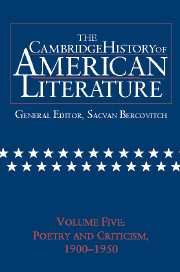2 - Robert Frost
from MODERNIST LYRIC IN THE CULTURE OF CAPITAL
Published online by Cambridge University Press: 28 March 2008
Summary
In its relation to the genteel poetic mode of the early years of the century, Louis Untermeyer's reconception of modern American poetry was not merely an attempt to achieve, on slightly different grounds, the popularity of the anthologies of Palgrave and Rittenhouse (though popularity was doubtless a prized reward). Instead, the driving force of Untermeyer's editorial and critical effort was a radical American populism that would welcome to its ranks any and all comers, but most significantly would welcome the kinds of people who had been hitherto excluded from the ranks of the published and read. A truly modern American poetry, in Untermeyer's strong opinion, would be closer to life as it was daily lived, allowing with no condescension and with veiled political intention the inclusion of vernacular voices, the unliterary, the (according to genteel standards) anti-poetic.
What this account of the new poetry left out is that such radicality is mainly perceptible only to those with keen awareness of the history of English poetry, because only those readers (not the unlettered man celebrated by Untermeyer's Whitmanesque ideal) are in a position to grasp shifts in literary history, to grasp, not a change from “literariness” to “life-likeness,” but a change from established kinds of literariness, and the social bases that supported such writing, to a new kind of literariness, presumably an organic expression of a new kind of social arrangement: literary change, in so many words, as index of social change, glimpse of and push in the direction American society might be heading – a culturally diverse democracy unheard of in human history.
- Type
- Chapter
- Information
- The Cambridge History of American Literature , pp. 33 - 59Publisher: Cambridge University PressPrint publication year: 2003

